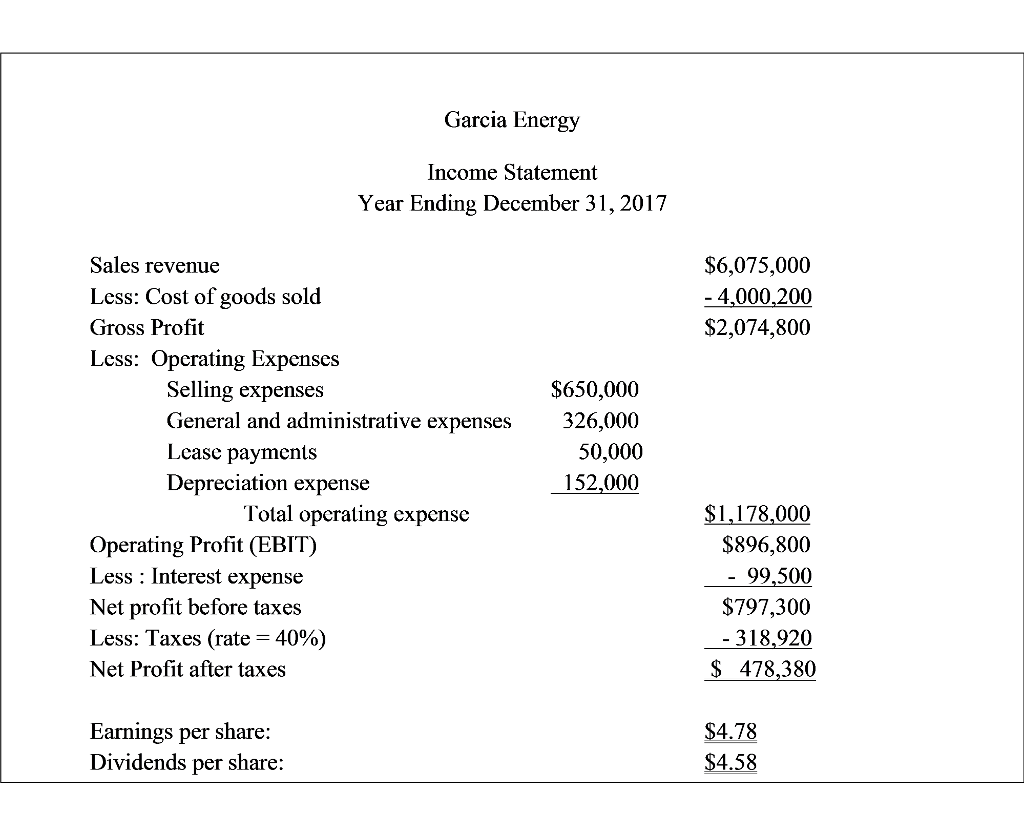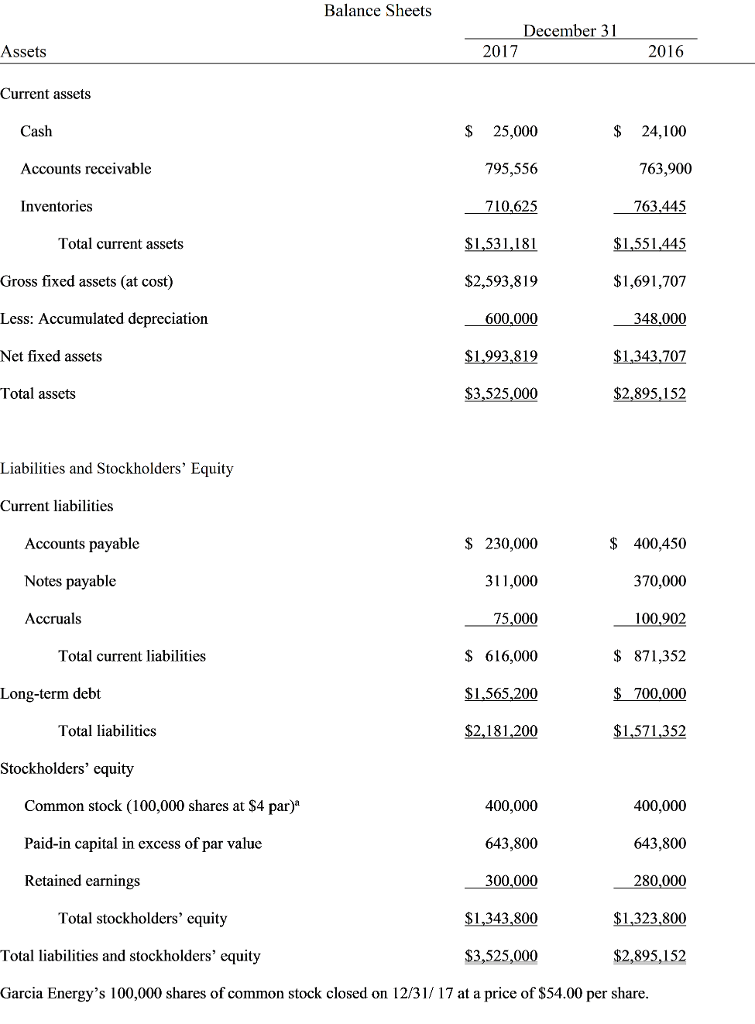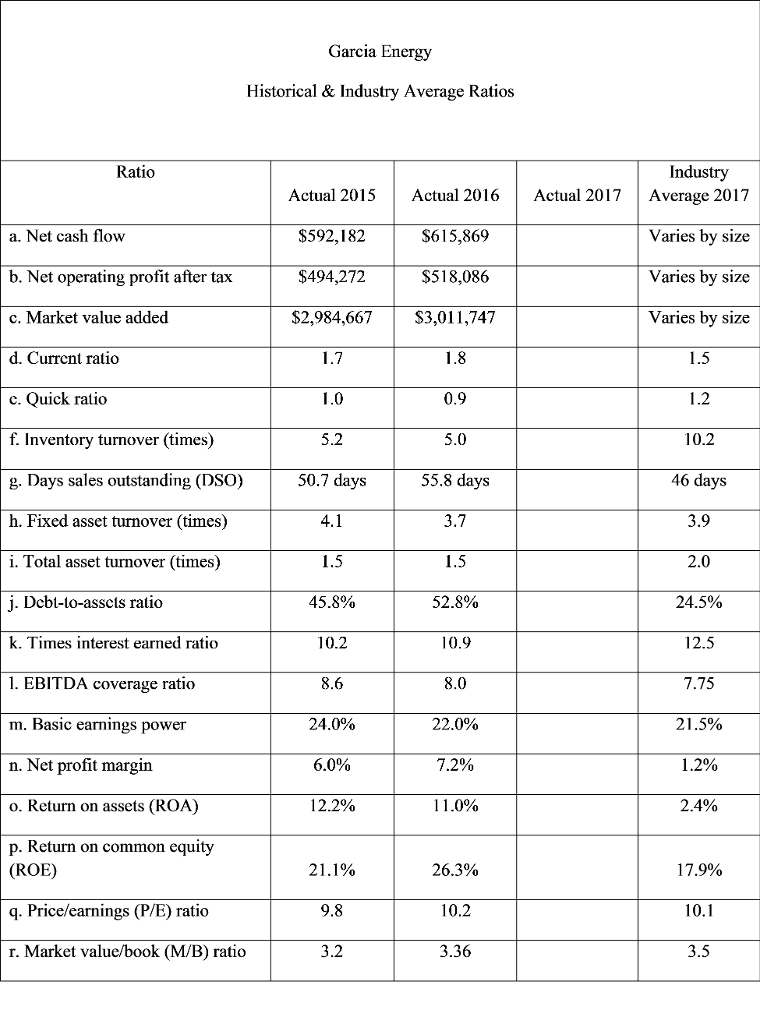Question
In order to bring you up to speed with Garcia Energys current situation, you have been asked to assess Garcia Energys financial performance during 2017
In order to bring you up to speed with Garcia Energys current situation, you have been asked to assess Garcia Energys financial performance during 2017 and its financial position at year-end 2017. To complete this assignment, you have gathered the firms 2017 financial statements (below). In addition, your assistant obtained the firms ratio values for 2015 and 2016, along with the 2017 industry average ratios. During the year, lease payments were $50,000, while sinking fund payments were $25,000.
To Do:
1. a.Calculate the firms 2017 financial ratios, and then fill in the table given at the bottom of this section. (ASSUME a 365-day year)
b.In between 200 and 300 words, analyze the firms current financial position from both a comparative and a trend standpoint. Break your analysis down into evaluations of the firms liquidity, asset management, debt, profitability, and market ratios.
c. In between 100 and 200 words, summarize the firms overall financial position on the basis of your findings in Part I.1 and Part I.2.



PART A IS ALREADY ANSWERED. I NEED HELP WITH PART B
As observed in Part I, over twenty percent of Garcia Energys inventory is invested in inventory. In order to make this component of its asset base more productive, Garcia Energy is analyzing two potential inventory expansion projects. Option B is more costly and provides larger cash inflows. Project A and Project B are mutually-exclusive projects. Andrew Potts believes that he the impact of this decision will extend out to three years. Garcia Energys required return is 10 percent on this project, which is discussed in greater detail in Part B. Results for Option A are provided. Complete the analysis for Option B, which is over $100,000 more costly (probably bumping the inventory component of total assets above 25 percent), and identify the project that should be selected.
| Option A | Option B | |||
| Initial Investment: $310,000 | Initial Investment: $440,000 | |||
| Year | Cash Inflow | Year | Cash Inflow | |
| 1 | $151,790 | 1 | $210,000 | |
| 2 | $151,790 | 2 | $190,000 | |
| 3 | $151,790 | 3 | $180,000 | |
PART A. Capital Budgeting
| Time | Cash Flows | Cumulative Cash Flows | Discounted Cash Flows | Cumulative Discounted Cash Flows |
| 0 | -440000.00 | -440000.00 | -440000.00 | -440000.00 |
| 1 | 210000.00 | -230000.00 | 190909.09 | -249090.91 |
| 2 | 190000.00 | -40000.00 | 157024.79 | -92066.12 |
| 3 | 180000.00 | 140000.00 | 135236.66 | 43170.55 |
Payback Period = 2 years + (40000/180000) = 2.22 years
Discounted Payback Period = 2 years + (92066.12/135236.66) = 2.68 years
NPV = sum of discounted cash flows = -440000 + 190909.09 + 157024.79 + 135236.66 = $43170.55
Profitability Index = (43170.55 + 440000)/440000 = 1.10
If IRR is i, then,
V = -440000 + 210000/(1+i) + 190000/(1+1)^2 + 180000/(1+i)^3 = 0
For i = 15%, V = 4628.9143
For i = 16%, V = -2446.1848
IRR = 15% + (16% - 15%) * (0 4628.9143)/(-2446.1848 -4628.9143) = 15.65%
FV of positive cash flows = 210000 * (1+10%)^2 + 190000 * (1+10%) + 180000 = 643100.0
MIRR = (643100/440000)^(1/3) 1 = 13.49%
| Option A | Option B | |
| Payback Period | 2.04 | 2.22 |
| Discounted Payback Period | 2.41 | 2.68 |
| NPV | 67479 | 43171 |
| Profitability Index | 1.22 | 1.1 |
| IRR | 22% | 15.65% |
| MIRR | 17.46% | 13.49% |
Comparing all parameters, Option A is better alternative. Hence, Garcia Energy should choose Option A.
Part B. Stock Price impacts
During the immediately preceding 4 years, the annual dividend paid on the firms common stock has grown from $3.91 to $4.58 (Do), or by approximately a dollar, which equates to a 4% growth rate. Andrew Potts believes that without the proposed investment, the historical annual dividend growth rate will continue into the future. Currently the required rate of return on the common stock is 13%.
Andres Potts research indicates that if the proposed inventory investment is undertaken, the annual rate of dividend growth will rise to 7% and the coming years dividend will rise to $4.90 per share. He feels that in the best case, the dividend would continue to grow at this rate each year forever into the future. Or, essentially, that he would replace this inventory project with a similar project repeatedly in the future. In the anticipated case, the 7% annual rate of dividend growth would continue for only two years, and then at the beginning of the third year the dividend growth rate would return to the 4% rate that was experienced over the past four years. In the worst case, the firms growth rate will drop to 2%, due to the use of valuable managerial resources managing inventory assignment across Garcia Energy and the losses incurred if the economy were to deteriorate in a world where it had amassed extra inventory.
As a result of the increased risk associated with the proposed risky investment, the required rate of return on the common stock is expected to increase by 1% to an annual rate of 14%. This required rate of return applies regardless of which dividend growth outcome occurs. Armed with the preceding information, Andrews has tasked you with assessing the impact of the proposed risky investment on the market value of Garcia Energys stock. In this scenario analysis, your examination has shown that the best case scenario is likely to happen 20 percent of the time, anticipated case 70 percent of the time, and worst case 10 percent of the time.
a. Current condition. Report the current value per share of Garcia Energys stock, without project acceptance, based on current required return and historical growth rate continuing into the future.
b Best case. Find the value of Garcia Energys common stock in the event that it undertakes the proposed inventory investment and the subsequent dividend growth rate stays at 7% forever.
c. Anticipated case. Recalculate the current price assuming that after two years the average annual dividend growth rate returns from 7% to 4%.
d. Worst case. Recalculate the current price assuming that project is undertaken and the growth rate drops to 2%.
e. In between 200 and 300 words summarize the above information in Part II.B and provide Andrew Potts with an analysis of his upcoming inventory decision from the perspective of its impact on the current stock price. Keep in mind that this decision will impact about 44 percent of inventory. Include additional perspective from the Internet using such terms as gross margin return on inventory investment (GMROII)
Step by Step Solution
There are 3 Steps involved in it
Step: 1

Get Instant Access to Expert-Tailored Solutions
See step-by-step solutions with expert insights and AI powered tools for academic success
Step: 2

Step: 3

Ace Your Homework with AI
Get the answers you need in no time with our AI-driven, step-by-step assistance
Get Started


